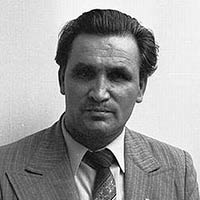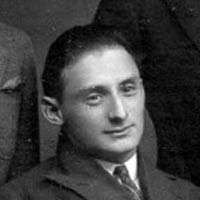Żagiew
Żagiew, the Jewish Freedom Guard (polish: Żydowska Gwardia Wolności) - a collaborative Jewish organization in the Warsaw Ghetto, established by the Jewish Gestapo section from members of the Office for Fighting Usury and Speculation ("Group 13") to infiltrate Jewish and Polish underground organizations, including those who were helping Jews.
Many members of Żagwia were associated with the Jewish organization "Group 13", which was also headed by Gancwajch, which cooperated with the Germans. The organization operated mainly in the Warsaw ghetto. Żagiew was established at the end of 1940 and existed until the Warsaw Ghetto Uprising in 1943.
Żagiew consisted of about 200 agents. They were commanded by: Leon Skosowski, Abraham Gancwajch, Dawid Sternfeld, Kenigl and "captain" Lontski. Albin Siwak Albin Siwak (1933 - 2019) - Polish worker, politician and communist unionist, author of memoirs and social activist. Member of the Political Bureau of the Central Committee of the Polish United Workers' Party, advisor to the Embassy of the Polish People's Republic in Tripoli. After retirement, he took up writing and journalistic activities. He was a board member of the Social Committee for the Defense of the Symbols of Remembrance of War Victims., in his book "Without fear" (volume II), states that, according to the balance sheet of Jewish Nazi collaborators, which it is in the central archive of the Central Committee of the Polish United Workers' PartyThe Politburo (abbreviation for Political Bureau) of the Polish United Workers (Communist) Party (PUWP; Polish: Polska Zjednoczona Partia Robotnicza, PZPR) was the chief executive body of the ruling communist apparatus in Poland between 1948–1989. Nearly all key figures of the regime had membership in the Politburo. The Politburo of the PUWP typically had between 9-15 full members at any one time. Usually, several alternate (or candidate) members were also elected to the Politburo, but unlike full members, alternate members did not possess full voting rights. , 10,000 collaborators were working with Żagiew one way or another. The most promising of them, the Gestapo allowed to carry firearms. About 300 Jews, members of the "Żagiew" organization and Jewish Gestapo agents, lived permanently in the Gestapo building at Szucha Avenue, from where they were departing “to work” in Warsaw. They specialized in tracking down Jews in the Aryan part of Warsaw.
Albin Siwak (1933 - 2019) - Polish worker, politician and communist unionist, author of memoirs and social activist. Member of the Political Bureau of the Central Committee of the Polish United Workers' Party, advisor to the Embassy of the Polish People's Republic in Tripoli. After retirement, he took up writing and journalistic activities. He was a board member of the Social Committee for the Defense of the Symbols of Remembrance of War Victims., in his book "Without fear" (volume II), states that, according to the balance sheet of Jewish Nazi collaborators, which it is in the central archive of the Central Committee of the Polish United Workers' PartyThe Politburo (abbreviation for Political Bureau) of the Polish United Workers (Communist) Party (PUWP; Polish: Polska Zjednoczona Partia Robotnicza, PZPR) was the chief executive body of the ruling communist apparatus in Poland between 1948–1989. Nearly all key figures of the regime had membership in the Politburo. The Politburo of the PUWP typically had between 9-15 full members at any one time. Usually, several alternate (or candidate) members were also elected to the Politburo, but unlike full members, alternate members did not possess full voting rights. , 10,000 collaborators were working with Żagiew one way or another. The most promising of them, the Gestapo allowed to carry firearms. About 300 Jews, members of the "Żagiew" organization and Jewish Gestapo agents, lived permanently in the Gestapo building at Szucha Avenue, from where they were departing “to work” in Warsaw. They specialized in tracking down Jews in the Aryan part of Warsaw.
Żagiew's main goal was to infiltrate the Jewish resistance network and reveal its ties to the Polish underground, which helped Jews and hid them in the General Government. The organization was able to inflict significant damage on both fronts. Żagiew's agents also played a key role in organizing the Hotel Polski in Warsaw scandal, a German plan to lure thousands of wealthy Jews into a trap, under false promises to evacuate to South America, and extort their money and valuables before sending most of them to their deaths.
Jonas Turkow Jonas Turkow or Yonas Turkov (1898 - 1988) - Polish actor and director, as well as a writer of Jewish origin, who became famous mainly for his roles in pre-war films and theater plays in Yiddish. wrote about Żagiew:
Jonas Turkow or Yonas Turkov (1898 - 1988) - Polish actor and director, as well as a writer of Jewish origin, who became famous mainly for his roles in pre-war films and theater plays in Yiddish. wrote about Żagiew:
Leon Skosowski and Kenigl officially served as collaborators of the SD and operated more often on the "Aryan" side than in the ghetto. Their task was to denounce the Jews on the "Aryan" side and to denounce Poles involved in [underground] political activity.
Żagiew was quickly unmasked by the jewish underground in the ghetto, and the fight against it was dealt primarily with the Jewish Military Union (ŻZW) - the first Jewish armed organization, which consisted almost entirely of officers and non-commissioned officers of the Polish Army. The commandant of the ŻZW was Lieutenant of the Reserve Mieczysław Apfebaum (aka "Kowal" [polish: "Blacksmith"]). In total, the ŻZW liquidated several dozen dangerous Jewish Gestapo agents. In October 1942, a new left-wing organization - ŻOB - also joined the fight against the Jewish agents of the Gestapo. Their boss, Abraham Gancwajch, was sentenced to death by the Polish underground and both Jewish organizations, but the execution was never carried out.